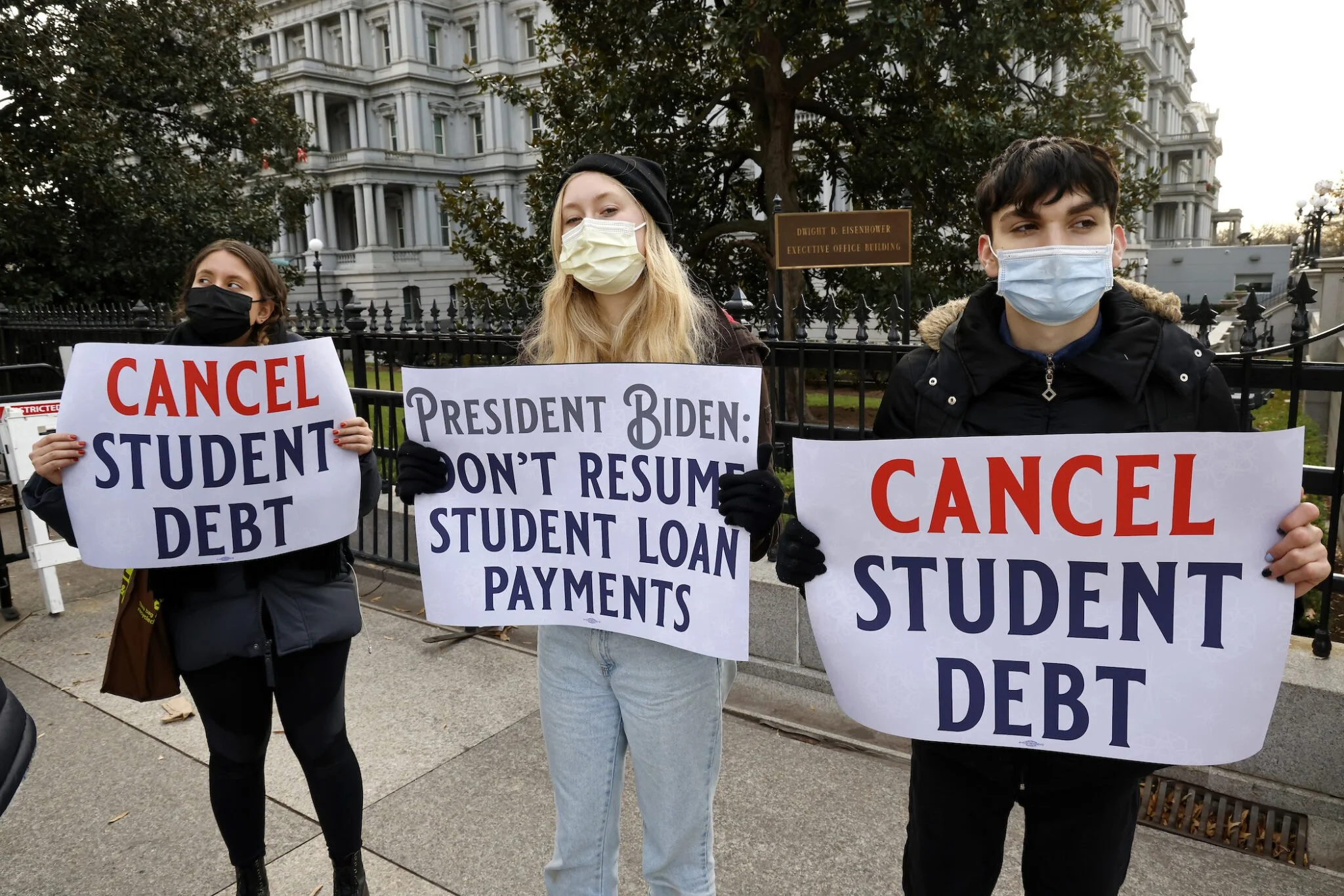OPINION: We need to pump the brakes on student loan debt relief
“Activists call on President Biden to cancel student debt during a protest near the White House on Dec. 15, 2021 in Washington, D.C.” Photo by Paul Morigi. Getty Images.
Zach Donaldson is a sophomore studying political science and an opinion writer for The New Political.
Please note that these views and opinions do not reflect those of The New Political.
On Aug. 24, the Biden administration announced its plan to cancel $10,000 in student-loan debt for borrowers making under $125,000. Coming out of the heat of COVID-19, the announcement was a shot of relief for millions of Americans.
Its merits as a one-time program are understandable, but the calls for successive forgiveness plans should be firmly and swiftly denied. Unwarranted and excessive student loan debt forgiveness is a policy cancer. It fails to address the key roots of rising college expenses, potentially increasing tuition and inflationary costs and ultimately moving us from a compassionate society to an entitled society.
To put into perspective the damages such a policy could accrue, we must first begin by establishing two hard truths: taking out a loan is a personal choice with accepted ramifications, and post-secondary education is not a right. Colleges are for profit institutions; attending them is certainly not mandatory, and it is a weighty investment. It is naive to think everyone is built for, or entitled to attend college.
A college degree opens doors to opportunities that are unreachable otherwise, and predatory lending is a real and pervasive contributor to the rising student debt crisis. It's what keeps this debate from being a black-and-white issue. There absolutely needs to be more education and protection for first-generation students with more resources to make informed decisions, and federal aid for attending universities.
That being said, the total responsibility of a loan ultimately falls on one person: the individual who decided to take it on. If someone cannot realistically afford the degree they are looking at, they have to choose whether it is better to defer or accept the consequences of going through with that choice.
If someone willingly goes into a field that will not give them the compensation to handle debt years down the road, it is not incumbent upon lawmakers to alleviate their concerns; it is up to them to be accountable for their actions. To expect the taxpayer to carry the burden of others' risky financial decisions is principally flawed, questionable as a short-term solution and absolutely disastrous as a long-term solution.
A four-year degree is not the only way to make a living, and perpetuating such a myth is why some borrowers will continue to feel pressured to take on mountains of debt without a clear plan of paying it back. Trade schools, blue-collar jobs, community colleges and numerous other fields are practical alternatives; it's fair for such workers to question why they have to subsidize the education of aspiring white-collar workers.
Biden plans to relieve debt for couples making up to $250,000 annually; it is incredibly likely many working class people will be helping fund the degrees of future hedge fund managers and corporate attorneys. Also, such a policy does not address the root problem of paying for higher education: sky-high attendance prices in public universities. Rather than investing funds to attack tuition expenses in conjunction with other reforms, debt relief kicks the ball down the road, allowing the price of colleges to continue to rise and exacerbating tax hikes and inflationary costs. Biden's plan is already predicted to add $300 billion to the federal deficit over the next decade. If borrowers continue to see debt relief as an option, colleges will adjust their prices accordingly, making paying for a degree far worse than before.
I believe America should be the land of opportunity, and I firmly support efforts to make a degree more accessible and achievable for groups traditionally kept from higher paying industries. But if we are serious about making the lives of working-class people better, we should do it in a responsible and sustainable fashion, not through one-time tricks that will cause real pain for people down the road. Installing student loan debt relief as part of the social safety net moves us from a compassionate society to an entitled society that shirks personal responsibility in favor of fantastical spending with money we don't have. Someone will have to pay the piper eventually: I hope we get wiser before that day comes.

